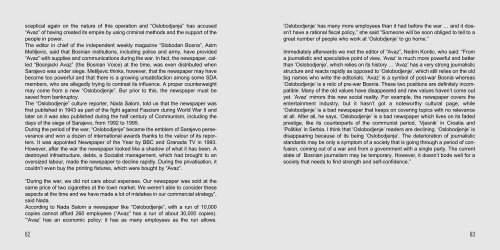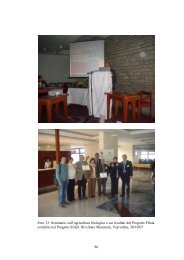Dove non suoanano più i fucili - Europuglia
Dove non suoanano più i fucili - Europuglia
Dove non suoanano più i fucili - Europuglia
You also want an ePaper? Increase the reach of your titles
YUMPU automatically turns print PDFs into web optimized ePapers that Google loves.
sceptical again on the nature of this operation and “Oslobodjenje” has accused<br />
“Avaz” of having created its empire by using criminal methods and the support of the<br />
people in power.<br />
The editor in chief of the independent weekly magazine “Slobodan Bosna”, Asim<br />
Metiljevic, said that Bosnian institutions, including police and army, have provided<br />
“Avaz” with supplies and communications during the war. In fact, the newspaper, called<br />
“Bosnjacki Avaz” (the Bosnian Voice) at the time, was even distributed when<br />
Sarajevo was under siege. Metiljevic thinks, however, that the newspaper may have<br />
become too powerful and that there is a growing unsatisfaction among some SDA<br />
members, who are allegedly trying to contrast its influence. A proper counterweight<br />
may come from a new “Oslobodjenje”. Bur prior to this, the newspaper must be<br />
saved from bankruptcy.<br />
The “Oslobodjenje” culture reporter, Nada Salom, told us that the newspaper was<br />
first published in 1943 as part of the fight against Fascism during World War II and<br />
later on it was also published during the half century of Communism, including the<br />
days of the siege of Sarajevo, from 1992 to 1995.<br />
During the period of the war, “Oslobodjenje” became the emblem of Sarajevo perseverance<br />
and won a dozen of international awards thanks to the valour of its reporters.<br />
It was appointed Newspaper of the Year by BBC and Granada TV in 1993.<br />
However, after the war the newspaper looked like a shadow of what it has been. A<br />
destroyed infrastructure, debts, a Socialist management, which had brought to an<br />
oversized labour, made the newspaper to decline rapidly. During the privatisation, it<br />
couldn’t even buy the printing fixtures, which were bought by “Avaz”.<br />
“During the war, we did not care about expenses. Our newspaper was sold at the<br />
same price of two cigarettes at the town market. We weren’t able to consider these<br />
aspects at the time and we have made a lot of mistakes in our commercial strategy”,<br />
said Nada.<br />
According to Nada Salom a newspaper like “Oslobodjenje”, with a run of 10,000<br />
copies cannot afford 260 employees (“Avaz” has a run of about 30,000 copies).<br />
“‘Avaz’ has an economic policy: it has as many employees as the run allows.<br />
62<br />
‘Oslobodjenje’ has many more employees than it had before the war … and it doesn’t<br />
have a rational fiscal policy,” she said “Someone will be soon obliged to tell to a<br />
great number of people who work at ‘Oslobdjenje’ to go home.”<br />
Immediately afterwards we met the editor of “Avaz”, Nedim Kontic, who said: “From<br />
a journalistic and speculative point of view, ‘Avaz’ is much more powerful and better<br />
than ‘Oslobodjenje’, which relies on its history … ‘Avaz’ has a very strong journalistic<br />
structure and reacts rapidly as opposed to ‘Oslobodjenje’, which still relies on the old<br />
big names who write the editorials. ‘Avaz’ is a symbol of post-war Bosnia whereas<br />
‘Oslobodjenje’ is a relic of pre-war Bosnia. These two positions are definitely incompatible.<br />
Many of the old values have disappeared and new values haven’t come out<br />
yet. ‘Avaz’ mirrors this new social reality. For example, the newspaper covers the<br />
entertainment industry, but it hasn’t got a noteworthy cultural page, while<br />
‘Oslobodjenje’ is a bad newspaper that keeps on covering topics with no relevance<br />
at all. After all, he says, ‘Oslobodjenje’ is a bad newspaper which lives on its faded<br />
prestige, like its counterparts of the communist period, ‘Vjesnik’ in Croatia and<br />
‘Politika’ in Serbia. I think that ‘Oslobodjenje’ readers are declining. ‘Oslobodjenje’ is<br />
disappearing because of its being ‘Oslobodjenje’. The deterioration of journalistic<br />
standards may be only a symptom of a society that is going through a period of confusion,<br />
coming out of a war and from a government with a single party. The current<br />
state of Bosnian journalism may be temporary. However, it doesn’t bode well for a<br />
society that needs to find strength and self-confidence.”<br />
63





